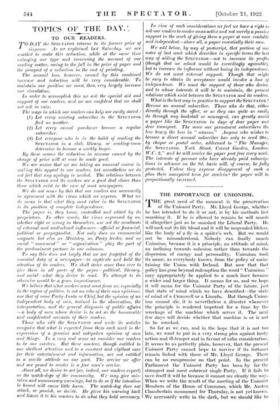TOPICS, OF THE DAY.7,,
TO OUR READERS. TO-DAY the SPECTATOR returns to its former price of sixpence. As we explained last Saturday, we are • enabled to make this yeduction, while at the same time enlarging our type and increasing the amount of our reading matter, owing to the fall in the price of paper and the prospect of a reduction in. the cost of printing.
The annual loss, however, caused by this combined increase and reduction will be very considerable. To maintain our position we must, then, very largely increase our circulation.
In order to accomplish this we ask the special aid and support of our readers, and we are confident that we shall not ask in vain.
The ways in which our readers can help are easily sta!ed : (1) Let every existing subicriber to the SPECTATOR find us another.
(2) Let every casual purchaser become a regular subscriber.
(3) Let everyone who is in the habit of reading the SPECTATOR in a club, library, or reading-room determine to become a weekly buyer.
By these means the reduction in revenue caused by the change of price will at once be made good.
We are aware that we are taking an unusual course in making this appeal to our readers, but nevertheless we do not feel that any apology is needed. The relations between the SPECTATOR and its readers are a good deal closer than those which exist in the case of most newspapers.
We do not mean by this that our readers are necessarily in agreement with the views which we express. What we do mean is that what they most value in the SPECTATOR is its position of complete independence.
The paper is, they know, controlled and edited by its proprietors. In other words, the views expressed by us, whether right or wrong in themselves, are not the resultants of external and undisclosed influences—official or financial, political or propagandist. Not only does no commercial magnate, but also no Ministry, no Party leader, and no social " movement" or " organization" play the part of the predominant partner in our columns.
To say this does not imply that we are forgetful of the essential duty of a newspaper—to captivate and hold the attention of its readers. We shall strive more than ever to give them in all pads of the paper—political, literary, and social—what they desire to read. To attempt to do otherwise would be a gross impertinence.
We believe that what readers want most from us, especially in the region of politics, is not an echo of their own opinions, nor that of some Party Junta or Chief, but the opinion of an independent body of men, trained in the observation, the interpretation, and the general diagnosis of public affairs —a body of men whose desire is to act as the honourable and confidential servants of their readers.
Those who edit the SPECTATOR and write its articles recognize that what is expected from them each week is the expression of a genuine and outspoken opinion of men and things. In a very real sense we consider our readers to be our masters. But these masters, though entitled to our obedient attention and to a constant and vigilant care for their entertainment and information, are not entitled to a servile altitude on our part. The service we offer and are proud to render is a free man's service.
Above all, we desire to act (as, indeed, our readers expect) as the watch-dogs of the community. We may give mis- taken and unnecessary warnings, but to do so if the intention is honest will cause little harm. The watch-dog does not attack, or punish, or decide. He gives his warning bark and leaves it to his masters to do what thek hold necessary. In view of such considerations we feel we have a right to ask our readers to render us an active and not merely a passive support in the work of giving them a paper at once readable and independent—above all, a paper essentially their own.
We add below, by way of postscript, that portion of our notes of last week which describes in specific terms the best way of aiding the SPECTATOR—not to increase its profits (though that we admit would be exceedingly agreeable), but to increase its, influence without losing its independence. We do not want external support. Though that might be easy to obtain its acceptance would involve a loss of independence. We want the support of those who desire, and to whose interests it will be to maintain, the present relations which exist between the SPECTATOR and its readers.
What is the best way in practice to support the SPECTATOR ? Become itn annual subscriber. Those who do that, either directly through the office, or as they can quite as easily do through any bookstall or newsagent, can greatly • assist a -paper like the SPECTATOR in days of dear .paper anti dear transport. The more our permanent subscribers the less heavy the loss in " returns." Anyone who wishes to become a direct annual subscriber has only to send 30s., by cheque or postal order, addressed to " The Manager, the SPECTATOR, York Street, Covent Garden, London, W.C. 2," and he will receive the paper post free every week. The interests of persons who have already paid subscrip- tions in advance on the ad. basis will, of course, be fully protected. Unless they express disapproval of such a plan their unexpired term for receivito the paper will be proportionally increased.


































































 Previous page
Previous page